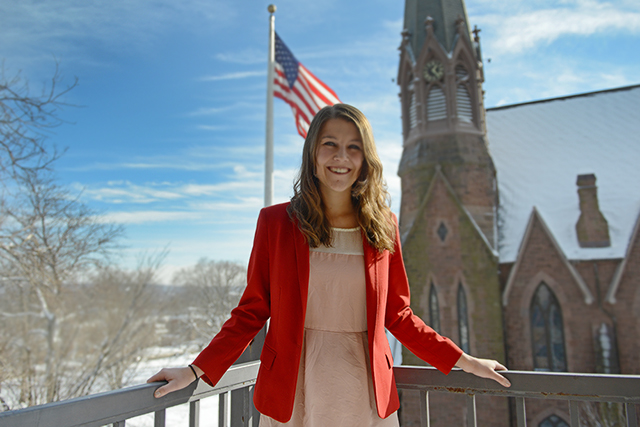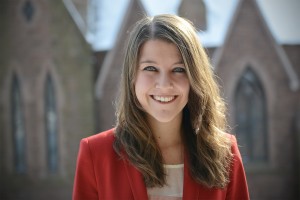Welch ’14 Encourages the State of Maryland to Rescind Forgotten Slavery Amendment

Last summer, history and government major Shannon Welch ’14 was an intern at the National Archives in Washington, D.C. She was paging documents at the Center for Legislative Archives when she stumbled across a little known and disturbing proposed constitutional amendment on the books in her home state of Maryland.
“I came upon this 13th amendment that was making slavery institutionalized for the rest of time,” she said. “The federal government could never touch it. Then I found a document that Maryland had ratified it, and I was shocked. They let me keep researching, and I found out that Maryland had never rescinded this amendment, while other states had.”
The amendment had been ratified by the state’s general assembly on Jan. 10, 1862, not long after the start of the Civil War when the union was in a state of disarray. When the final version of the 13th amendment abolishing slavery was enacted in 1865, many had forgotten or were unaware of the obsolete, so-called “shadow” version, which stated:
No amendment shall be made to the Constitution which will authorize or give to Congress the power to abolish or interfere, within any State, with the domestic institutions thereof, including that of persons held to labor or service by the laws of said State.

“You had two countries with two separate congresses pretending like they’re representing the whole country,” Welch said. “It was such a chaotic time period with so many constitutional loopholes that I think it just never got attention.”
Even Abraham Lincoln himself had endorsed the document, a political concession he found it necessary to make at the time. (It wasn’t considered to be in support of slavery, per se, but an encouragement for states to govern themselves — an awkward attempt to keep a fragile nation unified.)
“It was actually brought up in 1963 in the Georgia state legislature — to pass it,” Welch said. “In 1963… as part of a states’ rights push. While it seems like such a dusty old piece of paper, it definitely has relevance. Especially since being from Maryland you never really learn about how we were a slave state. We weren’t necessarily the most loyal member of the union. You kind of just learn about the shinier, prettier parts of history.”
Welch decided to bring the oversight to the attention of the current Maryland State Legislature by emailing every delegate on its website.
“Even though it’s symbolic, I think it’s very important to recognize this as part of state history,” she wrote.
There was only one response — and it was from state Sen. Brian Frosh (D), a Wesleyan alumnus from the class of ’68.
That was last July. A few weeks ago, she heard from Frosh again, and he told her it would be the first bill up for vote in the upcoming session. There was a public hearing with testimony about it on Thursday, Jan. 30.
“I doubt it will receive any real pushback,” Welch said. “It should pass pretty soon.”
Welch’s findings have garnered some attention from the press (notably, The Baltimore Sun and The Washington Post), but that doesn’t mean she’s changing her plans to attend law school next year. She considers her interest in the Civil War more of a hobby than a focus of her life’s work. Her senior thesis is on an unrelated topic too, an examination on Native American conversions by Jesuit priests and puritan missionaries in Maine in the late 1600s.
“I like these moments of cloudy history,” she said.

